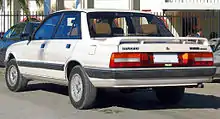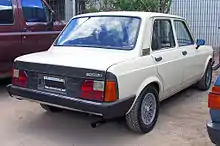Sevel Argentina
Sevel Argentina was an automobile company that produced and marketed Fiat, Peugeot, Alfa Romeo, Chevrolet, and Citroën automobiles for the Argentine market until it was dissolved in 1999. The company was created by merging Fiat's and Peugeot's Argentine operations (SAFRAR and Fiat Concord).[1]
| Type | Subsidiary |
|---|---|
| Industry | Motor vehicles |
| Founded | December 1, 1980 |
| Founder | Jean Paul Parayre & Umberto Agnelli |
| Defunct | 1999 |
| Headquarters | El Palomar, Buenos Aires, Argentina |
History
In Europe, Fiat and PSA began a 50/50 joint venture 1978 under the name of Sevel (from Société Européenne de Véhicules Légers or Società Europea Veicoli Leggeri). Two factories, Sevel Sud in Italy and Sevel Nord in France, still produce commercials and MPVs.

The Argentine manufacturers of Peugeots (SAFRAR, Sociedad Anónima Franco Argentina de Automotores CIF) and Fiats (FIAT Concord S.A.) then merged in December 1980,[1] in response to law No Nº 21.932 ordering the restructuring of the Argentine automotive industry.[2] The new company formed was also called Sevel, but here the versatile acronym stood for Sociedad Europea de Vehículos para Latinoamérica (European Company for making Vehicles for Latin America).
As part of the rationalization effort, production of passenger vehicles was to take place in Fiat's large El Palomar plant, while commercials, tractors,[3] vans, and heavy vehicles were to be built in Fiat's factory in Ferreyra, Córdoba province. Peugeot's Berazategui (in Buenos Aires) factory was decommissioned and production transferred to El Palomar, but increasing market demand in 1993 meant this plant was reopened.
In September 1981, Peugeot withdrew and the Fiat Group assumed control.[1] Fiat and Peugeot of Argentina separated in 1995, but Sevel kept building the existing products. Fiat, in anticipation of the 1997 end of Sevel's license, built a brand new plant for production of the new Siena. As Fiat's Argentine operations gradually became autonomous, Sevel moved their entire production to their El Palomar plant.[4] In 1999, PSA took over Peugeot/Citroën production under the name of Peugeot-Citroën de Argentina.

Production
In 1980, production of the existing lineups (Fiat 600, 133, 128, 125, Peugeot 404, and 504) continued, but newer models were announced along with the merger. Subsequently, the Fiat 147 (called Spazio) and Peugeot 505 were added, while other old models were either updated or discontinued. SEVEL-built cars received "8A4" as the manufacturer code in the vehicle identification number.
| Name | Time produced | Name | Time produced |
|---|---|---|---|
| Fiat 600 S | 1980–1982 | Peugeot 404 | 1980–81[5] |
| Fiat 133 | 1980–1982[6] | Peugeot 504 | 1980–1999 |
| Fiat 128, Europa | 1980–1982 | Peugeot 505 | 1981–1995 |
| Fiat 125, Mirafiori | 1980–1982 | Peugeot 504 Pickup | 1990–1995 |
| Fiat Spazio/Brío/Vivace (147) | 1982–1996 | Peugeot 405 | 1992–99 |
| Fiat Súper Europa (128) | 1983–1990 | Peugeot 306 | 1995–99 |
| Fiat Regatta | 1985–1995 | Peugeot 206 | 1999 |
| Fiat Iveco 150/190 (Spanish) | 1986–1995 | Peugeot Partner | 1999 |
| Fiat Duna | 1987–1995 | Chevrolet C-10 | 1985–91 |
| Fiat Uno | 1989–1995 | Citroën Berlingo | 1999 |
| Fiat Fiorino | 1990–1995 | ||
References
- World Cars 1984. Pelham, NY: L'Editrice dell'Automobile LEA/Herald Books. 1984. p. 408. ISBN 0-910714-16-9.
- LEY 21932/79 (Legal Decree) (in Spanish), Buenos Aires, Argentina, 1979-02-01, archived from the original on 2011-08-10
- http://pesadosargentinos.blogspot.com.ar/2012/02/fiat-someca-concord-agritecnica.html
- Bil Katalogen 1998. Stuttgart: Motor Presse International. 1997. pp. 53, 123. 0894-01.
- "I.A.F.A. SAFRAR". cocheargentino.com.ar. Archived from the original on 2010-04-02. Retrieved 2010-06-30.
- "FIAT SOMECA CONCÓRD S.A.C.I." cocheargentino.com.ar. Retrieved 2010-06-30.
- Much of this page incorporates information from Sevel Argentina S.A. on the Spanish-language Wikipedia. Retrieved June 29, 2010.
See also
- Autolatina
- Sevel Sud
- Sevel Nord
- List of cars manufactured in Argentina
- List of car models commercialized in Argentina